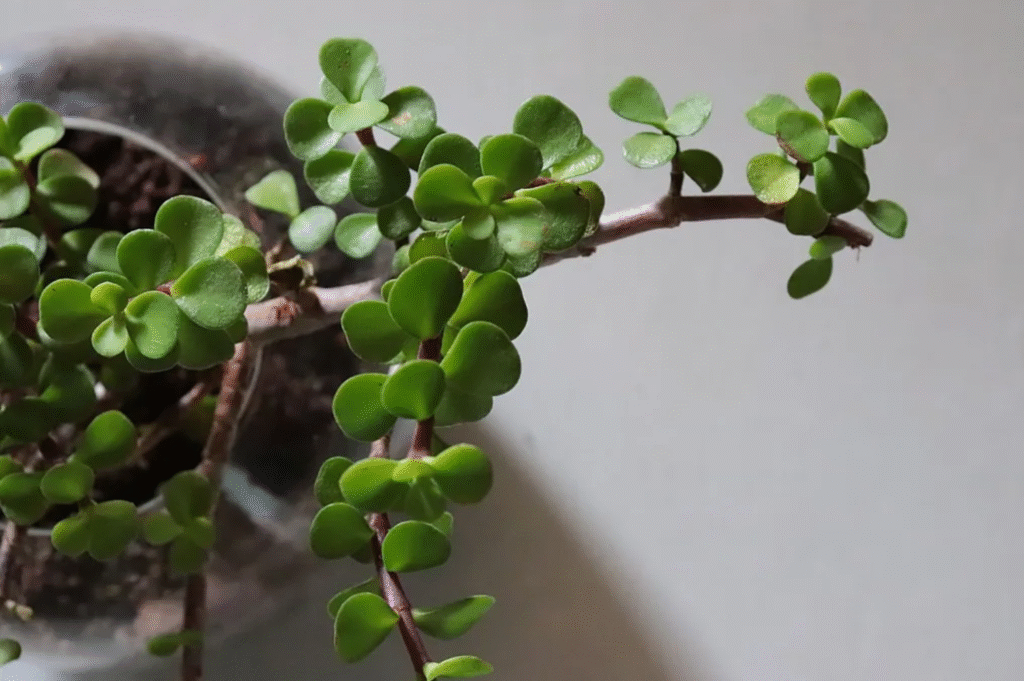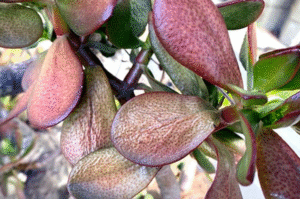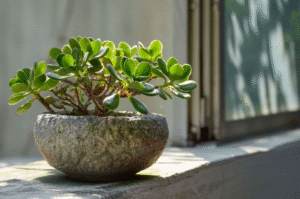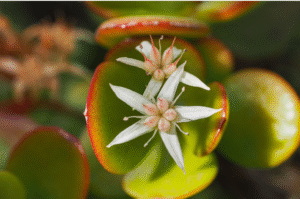Jade plants are beautiful, low-maintenance succulents that bring charm to any indoor setting. Their thick, glossy green leaves and tree-like stems make them a favorite among houseplant enthusiasts. But if you’re a dog owner, you may be wondering: Are jade plants poisonous to dogs? And if you still choose to grow them, what soil do they need for healthy development?
Let’s dig into both the toxicity risks and the best soil practices for jade plants in this article.
What Is a Jade Plant?
Jade plants (Crassula ovata) are popular succulents known for their thick leaves and woody stems. Native to South Africa, they thrive indoors with minimal effort. These plants can live for decades and are often passed down through generations as “money plants” or symbols of good luck and prosperity.
They are part of the Crassulaceae family, which includes other well-known succulents like Echeveria and Kalanchoe.
Are Jade Plants Poisonous to Dogs?
Unfortunately, Yes! Jade Plants Are Toxic to Dogs
According to the ASPCA (American Society for the Prevention of Cruelty to Animals), jade plants are considered toxic to dogs. The exact chemical compounds causing the toxicity are not fully identified, but ingestion can lead to a number of uncomfortable or even dangerous symptoms for your pet.
Signs of Jade Plant Poisoning in Dogs
If your dog chews on or ingests parts of a jade plant, here are some symptoms you might notice:
- Vomiting
- Lethargy or drowsiness
- Loss of coordination (wobbliness)
- Drooling
- Diarrhea
- Slow heart rate (in severe cases)
Not every dog will react the same way, and the severity can depend on how much the dog has ingested.
Important: If you suspect your dog has eaten a jade plant, it’s best to contact your veterinarian immediately.
How Toxic Is It? Is It Fatal?
In most cases, jade plant poisoning is not fatal, especially if treated quickly. However, some symptoms like vomiting and drowsiness can be serious if left untreated, especially in small dogs or puppies.
Always monitor your pets around houseplants and consider placing potentially toxic plants out of their reach or avoiding them altogether.
Pet-Friendly Alternatives to Jade Plant
If you’re concerned about pet safety, here are some beautiful, non-toxic alternatives:
- Spider Plant (Chlorophytum comosum)
- Areca Palm
- Calathea
- Boston Fern
- Prayer Plant (Maranta leuconeura)
These are all safe for dogs and can add lush greenery to your home without the risk.
But If You Still Love Jade Plants…
Many plant lovers still choose to keep jade plants and simply place them out of reach, on high shelves or in hanging baskets. If you do this, it’s essential to also provide proper soil for your jade plant to thrive.
Jade Plant Soil Needs: What’s Best for Healthy Growth?
1. Well-Draining Soil Is a Must
Jade plants are succulents, which means they hate sitting in soggy soil. The most important factor in jade plant soil is drainage.
Recommendation: Use a commercial cactus or succulent mix. These are specifically formulated to drain quickly and reduce root rot.
2. You Can Mix Your Soil
Want to DIY your own jade plant soil mix? Here’s a simple, effective recipe:
- 2 parts potting soil
- 1 part perlite or pumice (for drainage)
- 1 part coarse sand
This mix mimics their natural rocky, gritty habitat and keeps roots dry and healthy.
3. Avoid Regular Garden Soil
Never plant jade plants in regular garden soil or soil that retains too much moisture. Heavy soils can lead to root rot, which is one of the top killers of jade plants.
4. pH Range
Jade plants prefer slightly acidic to neutral soil with a pH range of 6.0 to 7.0. Most commercial succulent mixes already fall into this range, so you usually don’t need to worry unless your water or amendments throw it off balance.
Bonus Tips for Jade Plant Soil and Care
- Repot every 2–3 years to refresh the soil and check root health.
- Use terracotta pots with drainage holes, which allow excess water to evaporate and prevent soggy roots.
- Avoid frequent watering. Let the soil dry out completely between waterings.
- Fertilize lightly during the growing season (spring and summer) using a succulent-friendly formula.
Final Thoughts
To wrap it up: Yes, jade plants are toxic to dogs and should be kept out of reach if you have curious pups at home. Symptoms can range from mild to moderate, but prompt veterinary attention usually ensures recovery.
If you still want to enjoy this beautiful plant in your home, just be cautious and place it in safe spots. And for the healthiest plant possible, well-draining soil is the secret ingredient to long-term success.
A jade plant can be a rewarding and stunning addition to your plant collection, just make sure both your plant and your pup can live together safely under one roof.






